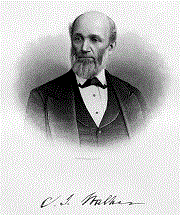Legislator Details

Portrait of Charles Irish Walker scanned from Rep.Dist. 1 page previous to p.147.
Vital Records Information:
Marital Information:
Married Mary A. Hinsdale on April 12, 1838. She died in February 1864. Married Ella Fletcher in May of 1865.
Number of Children: 0
Background
Education:
District school, one term in a select school in Utica, NY. Studied law under Chief-Justice Martin and Hon. Don Bradley of Brattleboro, VT
Biographical Sketch:
Honorary Charles Irish Walker was born one of 13 children on April 25, 1814 in Butternuts, Ostego County, NY. At age 16 Hon. Charles Walker began teaching for a few months before deciding to go into a store near Cooperstown, which he stayed at for four years. In 1835 he went into the mercantile business at Cooperstown, but sold it a year later when he was appointed agent to look after Western Lands. He soon moved to Grand Rapids, MI. In the Fall of 1836 he was elected a member of the convention called to consent to the terms proposed by Congress for the admission of Michigan into the Union. After the financial crash of 1837 he went into the newspaper business, as the editor and proprietor of the Grand River Times, but sold out after two years. In 1838 he was elected Justice of the Peace. He took up law under Chief-Justice Martin and then Hon. Don Bradley, of Brattleboro, VT. He was admitted to the bar in 1843 and began practicing with Mr. Bradley. Mr. Walker moved his practice to Rockingham, VT for three years. in June 1851 he moved back to Michigan to start a practice with his brother, E. C. Walker in Detroit. He withdrew from the practice in 1857 to practice law by himself. He became interested in history and presented several notable speeches and papers on the history of Detroit. In the spring of 1859 he was appointed Professor in the law department of Michigan University. Mr. Walker was appointed Judge of the Wayne Circuit Court by Governor Crapo, but ten months later when the proposition to increase the salaries of Circuit Judges failed in the Constitutional Convention, he resigned. He was appointed one of the commissioners to examine the penal, reformatory, and charitable institution in Michigan, which lead to the creation of the Board of State Charities. He was the first chairman. He was a Democrat, but often voted against the Democratic options if they did not take a strong stance against slavery. He was a member of several denominations, depending on the situation at the time.
Notable Facts:
President of the Young Men's Society, Corresponding Secretary of the reorganized Historical Society of Michigan, member of the Board of Education,
